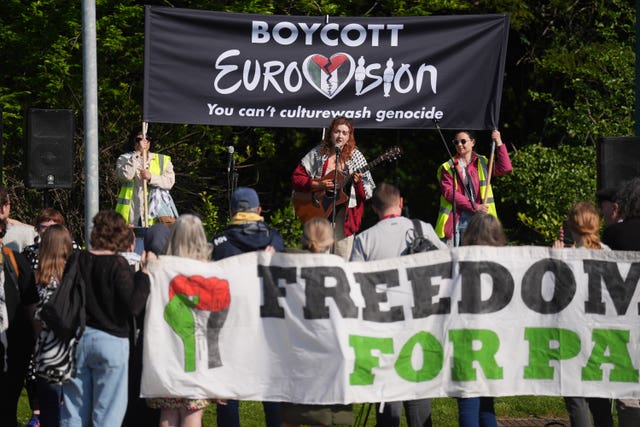BBC boss Tim Davie says Eurovision Song Contest has ‘never been about politics’
By Lauren Del Fabbro, PA Entertainment Reporter
BBC director general Tim Davie said the Eurovision Song Contest has “never been about politics” as the corporation faces calls to withdraw from the competition if Israel participates.
It comes as a string of European broadcasters, including the Dutch Avrotros and RTÉ, have called for a boycott of the music competition if Israel takes part.
Speaking on Monday to the Commons Public Accounts Committee, Mr Davie, a board member of the European Broadcasting Union (EBU), said: “From a BBC point of view, we’re very aware of the concerns.
“Eurovision never has been about politics and should be a celebration of music and culture that brings people together.
“That is really important, that we try and preserve throughout, but at this stage, I’m supporting the European Broadcasting Union’s work, and they need to get on with it.
“This is a contest which is about the broadcasters from that nation submitting a song, ensuring that process works properly and is truly apolitical.
“There’s quite a lot of detail to get through for the European Broadcasting Union.
“Then as an independent BBC, we will look at that, and then we can go from there.”
When asked whether the corporation will listen to its viewers on these subjects, Mr Davie said: “We’re here to serve the public.
“There are a number of issues that are highly divisive within society. Of course we look at the views of the people we serve and our shareholders, the public, absolutely.”
On Friday, leaders of the Green parties of England and Wales, Scotland and Northern Ireland urged a boycott in a joint letter to Mr Davie.
The BBC faced similar calls from musician and songwriter Phil Coulter, who co-wrote the UK’s winning 1967 entry Puppet On A String and said there was a “double standard” because Russia and Belarus had previously been expelled from the contest.

The calls for a boycott are in protest against Israel’s offensive in Gaza.
Israel launched its invasion on Gaza as a retaliation to Hamas’s October 7th 2023 attacks which, according to the British Red Cross, saw almost 1,200 people killed and 200 people taken as hostages.
Since then, Israel has killed more than 64,803 Palestinians, according to Gaza’s Health Ministry, which does not specify how many were civilians or combatants but says around half of those killed were women and children.
A state of emergency has since been declared in Gaza with the UN confirming a famine for the first time in August, which has been described by the UN’s humanitarian chief Tom Fletcher as a “systemic obstruction by Israel”.
This year’s Eurovision Song Contest saw Austria’s JJ win with the emotional song Wasted Love, while Israeli singer Yuval Raphael was the runner-up.
Israel made its Eurovision debut in 1973 after it became part of the EBU.
The rule has allowed countries such as Azerbaijan, who hosted in 2012, and Georgia to compete, while Australia has competed since 2015.
The UK is part of the Big Five at Eurovision who are guaranteed entry into the final of the song contest thanks to the level of their financial contributions to the EBU.


